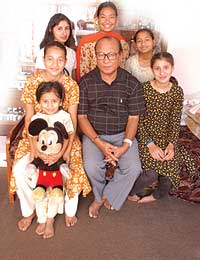 "I thought that they were the most needy children," is the straightforward reason Singh Bahadur Moktan gives for dedicating his life to helping the children of prisoners. "Without committing any crimes they have to live in prison. They have no future at all."
"I thought that they were the most needy children," is the straightforward reason Singh Bahadur Moktan gives for dedicating his life to helping the children of prisoners. "Without committing any crimes they have to live in prison. They have no future at all." Singh Bahadur set up Parijat Nestling Home, a place about as far from a prison environment as it is possible to get, named after the poetess known for her political and poignant verse. In Parijat, 29 girls-three quarters of whom were rescued from Kathmandu's jails-live without fear of harassment or molestation. It is a cheerful extended family in which the director is more a father figure than a headmaster.
Singh Bahadur believes passionately in providing education according to the ancient Vedanta philosophy in which children learn Sanskrit and happily recite prayers in the morning, before meals and at bedtime. As well as attending nearby private schools during the day, they are taught yoga, martial arts and handicrafts at home.
Parijat is not just a temporary refuge from the horrors of prison, but 'life membership' in the family. Things don't end when the girls leave school, they get job placements. Singh Bahadur hopes to spread hope like a "wave within the prison", astonishing incarcerated parents by the change in attitude of their children.
He tells the story of one girl, who on a visit to her mother in prison, refused to sit on the bed where she had sat before, because it was dirty. On the next visit, the bed was clean. Parijat accepts only girl children, and this is deliberate. "In Nepal the first disconnect happens when the mother gives priority to the boys," explains Singh Bahadur. "If we can make good mothers, maybe we can change Nepal." (Natalie Toms)


